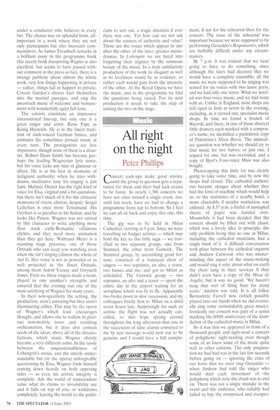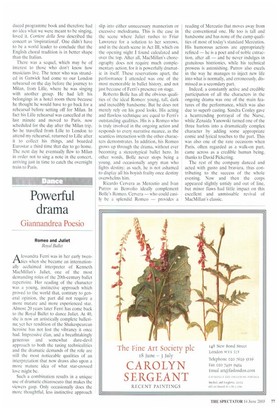All right on the night
Peter Phillips
Ctoncert cock-ups make good stories, V./until the group in question gets a reputation for them and their bad luck ceases to be funny. In nearly 1,300 concerts we have not once missed a single event, nor, until last week, have we had to change a programme from top to bottom. So I feel we can all sit back and enjoy this one, this time.
The gig was to be held in Milan Cathedral, starting at 9 p.m. Since we were travelling on budget airlines — which may hold the key to this little saga — we travelled in two separate groups, one from Stansted, the other from Gatwick. The Stansted group, by astonishing good fortune, consisted of a balanced choir of singers — two sopranos, an alto, a tenor, two basses and me; and got to Milan as scheduled. The Gatwick group — two sopranos, an alto and a tenor — spent the entire day in the airport waiting for an aeroplane which was fit to fly. Apparently two broke down in slow succession, and my colleagues finally flew to Milan on a third seven hours late. Surprisingly for such an airline, the flight was not actually cancelled, so that hope sprang eternal throughout the long afternoon that one in the succession of false alarms conveyed to me by text message would turn out to be genuine and I would have a full comple
ment, if not for the rehearsal then for the concert. The issue of the rehearsal was important because we were supposed to be performing Gesualdo's Responsories, which are hellishly difficult under any circumstances.
By 7 p.m. it was evident that we were going to have to do something, since although the fates had decreed that we would have a complete ensemble, all the music we were supposed to be singing was scored for six voices with two tenor parts, and we had only one tenor. What we needed was four-voice music, and we had none with us. Unlike in England, most shops are still open in Italy at seven in the evening, including, as it turned out, specialist music shops. In time we found a branch of Ricordi; and there, in one of those discreet little drawers each marked with a composer's name, we identified a prehistoric copy of Palestrina's Missa Brevis. The immediate question was whether we should try to find music for two halves, or just one. I argued for one, but was overruled, and a copy of Byrd's Four-voice Mass was also bought.
Photocopying this little lot was clearly going to take some time, and by now the shops had closed. The cathedral authorities became opaque about whether they had the kind of machine which would help us, so the assistance of a nearby hotel, a more charitable if secular institution, was enlisted. At 8.57 p.m. a fistful of unstapled sheets of paper was handed over. Meanwhile it had been decided that the concert should be filled out with chant, which was a lovely idea in principle, the only problem being that no one in Milan, including the cathedral musicians, had a single book of it. A difficult conversation took place between the cathedral organist and Andrew Carwood, who was masterminding this aspect of the music-making and would sing it solo, about what on earth the choir sang in their services if they didn't even have a copy of the Alissa de Angelis; but it was no good. 'We haven't sung that sort of thing here for many years.' Andrew was told. It is all folksy Bernadette Farrell now (which possibly played into our hands when we did eventually sing some unmistakably great music). Ironically our concert was part of a series marking the 600th anniversary of the foundation of the cathedral music in Milan.
So it was that we appeared in front of a thousand people and sight-read a concert of polyphony: sight-reading even though some of us knew some of the music quite well in other editions. The only preparation we had had was in the last few seconds before going on — ignoring the cries of our hosts that we must sing Gesualdo — when Andrew had told the singer who would start each movement of the polyphony which note the chant was to end on. There was not a single mistake in the event and the audience, who reliably had failed to buy the overpriced and overpro
duced programme book and therefore had no idea what we were meant to be singing, loved it. Corriere della Sera described the concert as 'inspirational'. One didn't have to be a world leader to conclude that the English choral tradition is in better shape than the Italian.
There was a sequel, which may be of interest to those who don't know how musicians live. The tenor who was stranded in Gatwick had come to our London rehearsal on the day before the journey to Milan, from Lille. where he was singing with another group. He had left his belongings in a hotel room there because he thought he would have to go back for a rehearsal before setting off for Milan. In fact his Lille rehearsal was cancelled at the last minute and moved to Paris, now scheduled for the day after the Milan trip. So he travelled from Lille to London to attend my rehearsal, returned to Lille after it to collect his things, and boarded Eurostar a third time that day to go home. The next day he eventually flew to Milan in order not to sing a note in the concert, arriving just in time to catch the overnight train to Paris.



































































































 Previous page
Previous page